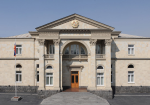All 59 of the United National Movement (UNM) Members of Parliament walked out of the Georgian Parliament on 8 November in protest of the arrest of three senior defence officials (see story in this issue) on allegations of abuse and what they deem an unnecessary tax audit of the Georgian Public Broadcaster (GPB).
David Bakradze, parliamentary leader of the UNM, told journalists on Thursday that his party would not work under the hostile conditions imposed by the Georgian Dream administration. After staging the walk out on Thursday, Bakradze stated that the UNM was suspending its work in parliament given the “current conditions” in which “the authorities are trying to establish control over the military and the televisions.” He did not specify under which circumstances the UNM parliamentarians would return. UNM lawmakers accuse the Ivanishvili administration of political motivations in these two developments, stating that the Georgian Dream fabricated the charges laid against the chief of staff of the military to put their own candidate in place. A charge which the government denies. More…



